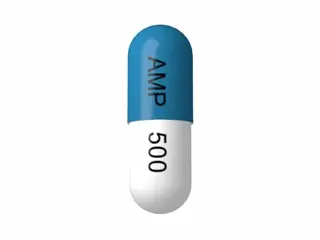| Package | Dosage | Price | Price per Dose | |
|---|---|---|---|---|
| Dosage: 250mg | ||||
| 270 pill | 250mg | £108.43 | £0.40 | |
| 180 pill | 250mg | £74.24 | £0.41 | |
| 120 pill | 250mg | £50.79 | £0.42 | |
| 90 pill | 250mg | £40.04 | £0.44 | |
| Dosage: 500mg | ||||
| 270 pill | 500mg | £237.39 | £0.88 | |
| 180 pill | 500mg | £162.16 | £0.90 | |
| 120 pill | 500mg | £111.36 | £0.93 | |
| 90 pill | 500mg | £90.85 | £1.01 | |
| 60 pill | 500mg | £68.38 | £1.13 | |
| 30 pill | 500mg | £40.04 | £1.34 | |
| 20 pill | 500mg | £30.28 | £1.51 | |
| 10 pill | 500mg | £15.62 | £1.53 | |

Acillin Description
Overview of Acillin
Acillin is a medication widely used for its antibacterial properties. It contains the active substance ampicillin, which belongs to the penicillin class of antibiotics. This medication is prescribed to treat various bacterial infections caused by susceptible organisms. Its effectiveness in combating infections has made it a popular choice among healthcare professionals worldwide. Acillin works by inhibiting the growth of bacteria, ultimately leading to their destruction. The medication is available in different forms, including capsules, powders for reconstitution, and injections, providing flexibility based on the type and severity of the infection.
How Acillin Works
The active ingredient in Acillin, ampicillin, functions by disrupting the synthesis of bacterial cell walls. This action weakens the bacteria, causing them to rupture and die. Since human cells do not have cell walls, the medication selectively targets bacteria, making it effective with minimal harm to the patient's own tissues. It is particularly effective against a range of bacteria, including some strains of Streptococcus, Escherichia coli, and Salmonella, among others. The rapid action of Acillin helps alleviate symptoms of bacterial infections quickly, often within a few days of starting therapy.
Uses and Applications
Acillin is commonly prescribed for respiratory tract infections, urinary tract infections, skin and soft tissue infections, and meningitis. It is also used in the treatment of certain gastrointestinal infections. The prescribing healthcare provider considers factors such as the infection site, severity, and the patient's medical history before recommending Acillin. For optimal results, it is important to follow the prescribed dosage and duration of treatment, even if symptoms improve early. This helps prevent the development of antibiotic-resistant bacteria and ensures complete eradication of the infection.
Potential Benefits of Acillin
Many patients benefit from Acillin due to its broad spectrum of activity and relatively low side effect profile. When taken correctly, it effectively clears bacterial infections, reduces symptoms such as fever and pain, and prevents complications associated with untreated infections. Its availability in various formulations also allows for tailored treatment plans according to individual patient needs. Additionally, Acillin is generally well-tolerated by most patients, making it a reliable option for many bacterial infections.
Considerations and Precautions
Like all antibiotics, Acillin should be used responsibly. It is crucial to complete the entire course prescribed by the healthcare provider, even if symptoms disappear before the treatment ends. This reduces the risk of bacteria developing resistance. Patients with allergies to penicillin or other beta-lactam antibiotics should avoid Acillin, as allergic reactions can range from mild rashes to severe anaphylaxis. Other precautions include informing the doctor about any pre-existing health conditions or ongoing medications, as there may be interactions. Monitoring for possible side effects during treatment is also recommended.
Possible Side Effects
Most people tolerate Acillin well, but some may experience side effects. Common reactions include nausea, diarrhea, rash, and skin irritation. Serious side effects are rare but can include allergic reactions, such as swelling, difficulty breathing, and severe skin rashes. If any unusual or severe symptoms are observed, medical attention should be sought immediately. It is also important to report any gastrointestinal disturbances or signs of allergic response to your healthcare provider promptly.
Conclusion
In summary, Acillin is an effective and versatile antibiotic, valued for its ability to treat a wide range of bacterial infections. Proper usage and adherence to medical guidance are essential to maximize its benefits and minimize risks. Patients should be aware of potential side effects and take necessary precautions, especially if they have known allergies or underlying health conditions. When used responsibly, Acillin can be a powerful tool in overcoming bacterial infections and restoring health.
See Also
